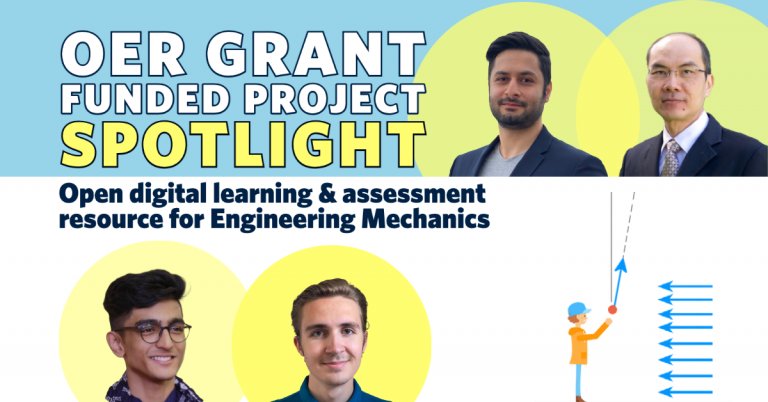
Project title: Open digital learning and assessment resource for Engineering Mechanics (Dynamics)
Project lead: Peyman Yousefi (UBCO Faculty, Engineering),
Project team: Ernest Goh (UBCO Faculty, Engineering), James Ropotar (UBCO Engineering student) and Akshat Poddar (UBCO Computer Science student); with support from: Firas Moosvi (UBCO Faculty, Computer Science) and Donna Langille (UBCO Librarian).
Background on the Open Educational Resource project.
The goal of this project is to develop a question bank that contains formula-driven questions, including random numerical values, for pre-, post-, and in-lecture activities. Using the open-source online platform, PrairieLearn, all UBC students will have access to these questions, which were previously only available to students with paid textbook access. In this manner, active learning is promoted and students are engaged in lectures and course materials. Instructors explain sample questions during lectures, and students follow along by solving the same questions with different numerical values. Additionally, instructors may use these materials without restriction by a limited access time and adapt or modify them for the courses with similar content.
There are three phases of this project: Phase (I) is the in-lecture activities; Phase (II) is the tutorials and assignments; and Phase (III) is the assessment and practice materials. The team is currently working on phase (I), which will be available for students in UBCO by January 2022. Students and faculty members of UBCO and UBCV, as well as all Canadian universities, will be able to use the learning materials.
Why choose Open?
In a learning environment, equity and inclusion should be prioritized to ensure that learners with different knowledge backgrounds and abilities can flourish. The affordability of commercial learning tools is a concern for students, especially international students. And so, Open Educational Resources (OER) and providing free materials to students are important steps on a path to improving equity and inclusion. The way UBC supports students around the world and provides resources that address these concerns, led Dr. Peyman Yousefi to embark on OER development. OERs are constantly growing and, in many cases, self-modifying over time, and the users (students) contribute to this growth by providing feedback and monitoring their course progress; therefore, OERs help promote more effective learning. Furthermore, active learning allows students to assess their own learning, and the results of their self-assessment practice can be useful in strengthening their understanding of course content.
Project Impact
Engineering Mechanics (Dynamics) is a core course taken by all engineering students in their first year of study. Practice resources developed through this project will be used in APSC 181 Dynamics, with about 400 enrolled students. By providing free access to the learning materials, students will be able to develop a deeper understanding of the course content. The course’s active learning strategy further enhances students’ understanding of engineering calculations. In addition, students will have access to these online resources in the subsequent years of their studies, so they can refresh their knowledge on engineering. The proposed learning resources can be re-used or updated by a broader community of engineering and science educators, providing students with an alternative to expensive commercial resources.
Advice for those considering OERs
Involve students in the development of OER. The students can use the provided materials and provide feedback to assist their further refinement.
In general, the use of OERs is not limited to the course for which they were originally developed, but can be shared with educators building similar materials in courses that have similar content.
While this project is a small building block of OER, Dr. Peyman Yousefi encourages everyone to take steps to enhance learning environments to create a better experience for students and for the future community.